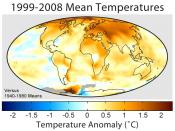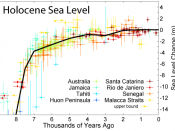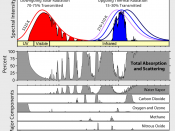The Greenhouse Effect refers to the phenomenon in the atmosphere, whereby the presence of greenhouse gases disturbs the energy balance of the atmosphere. Because of greenhouse gases, the atmosphere re-radiates less infrared energy than it absorbs. There is then a result net warming of the atmosphere. That is natural greenhouse effect.
The major greenhouse gases in the atmosphere which related to human activities are carbon dioxide (CO2), methane, (CH4), nitrous oxide (N2O), chlorofluorocarbons (CFCs) and ozone (O3).
Global warming is one of the consequences of enhanced greenhouse effect. The Earth's climate must change somehow to restore the balance between incoming and outgoing radiation. This "climatic change" will include a "global warming" of the Earth's surface and the lower atmosphere as warming up is the simplest way for the climate to get rid of the extra energy. However, a small rise in temperature will induce many other changes, like cloud cover and wind patterns.
Rising of sea level is another consequence. Sea level will rise when global warming takes place. Warmer temperature cause sea level to rise because of the thermal expansion of seawater. Water from melting glaciers and the ice sheets of Greenland and the Antarctica would also add water to the ocean.
There are many potential impacts on human life. Rise in sea level will bring a severe economic impact on low-lying coastal areas and islands, for examples, increasing the beach erosion rates along coastlines, rising sea level displacing fresh groundwater for a substantial distance inland. The effect of global warming may also affect the atmospheric general circulation and altering the global precipitation pattern as well as changing the soil moisture contents. And, the loss of coastal wetlands reduces fish populations, especially shellfish. It affects the ecosystem as well. Besides, the regional rainfall patterns will also change.


